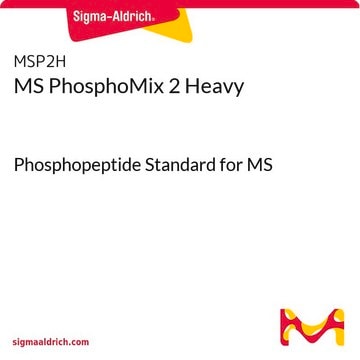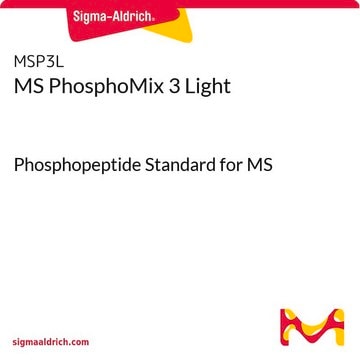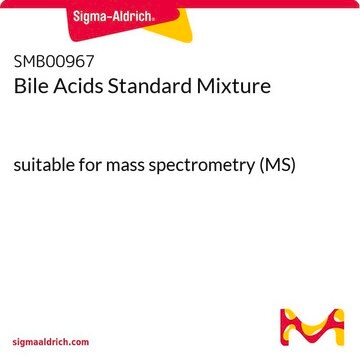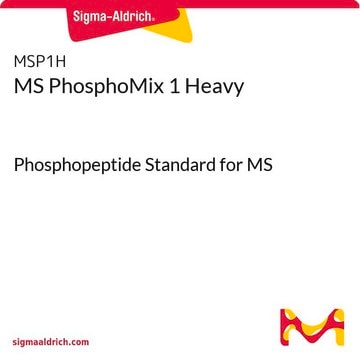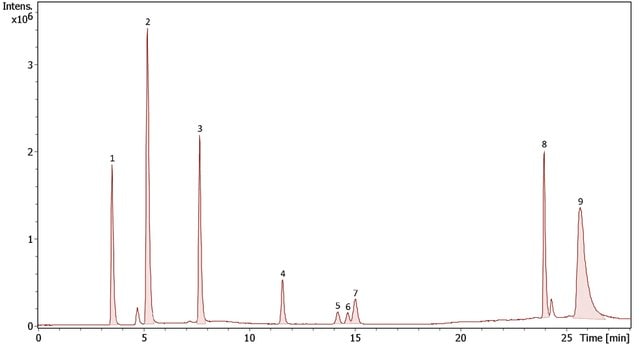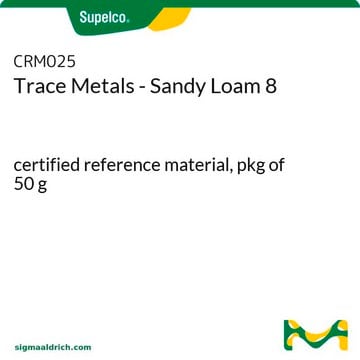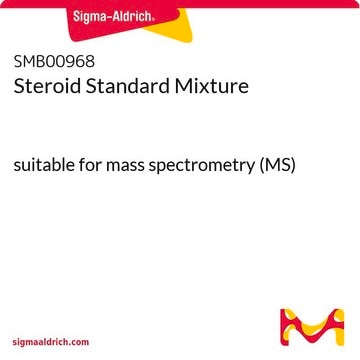MSP3H
MS PhosphoMix 3 Heavy
Phosphopeptide Standard for MS
Iniciar sesiónpara Ver la Fijación de precios por contrato y de la organización
About This Item
UNSPSC Code:
12352200
NACRES:
NA.24
Productos recomendados
quality
Phosphopeptide Standard for MS
Quality Level
analyte chemical class(es)
amino acids, peptides, proteins
packaging
pkg of 200 pmol total phosphopeptides
technique(s)
HPLC: suitable
LC/MS: suitable
application(s)
food and beverages
format
multi-component solution
storage temp.
−20°C
General description
The MS PhosphoMix line of products allows for the testing of the strengths and weaknesses of phosphopeptide sample processing, mass spectrometry analysis and instrument configurations. The mixes are produced from synthetic phosphopeptides with sequences derived from naturally occurring peptides as identified by Mann et al. in HeLa cells.† Because the sequences are derived from mammalian cells, many natural phosphorylation motifs, such as those that present an abundance of proline, are represented.† Additionally, the phosphopeptide distribution in each mix has been chosen to present a broad range of characteristics, including ionizability, LC retention time, charge state, and isoelectric point. Finally, PhosphoMix-1, 2, and 3 were designed in a complementary fashion, as highlighted on the following page. For example, all three mixes contain peptides of the same sequence with different sites of phosphorylation.
Each of the three phosphopeptides mixes are available in their naturally occurring isotopic abundances (light) or as stable isotope enriched versions (heavy), making the set of products highly amenable to quantitative analyses, allowing users to compare recovery between workflows or techniques.
More info and FASTA file
Each of the three phosphopeptides mixes are available in their naturally occurring isotopic abundances (light) or as stable isotope enriched versions (heavy), making the set of products highly amenable to quantitative analyses, allowing users to compare recovery between workflows or techniques.
- Naturally occurring peptide sequences
- Broad range of peptide characteristics
- Complementary product designs
- Available in light and heavy versions
More info and FASTA file
Legal Information
This product is licensed under U.S. Patent No. 7,396,688 and foreign counterparts from E. I. du Pont de Nemours and Company. The purchase of this product conveys to the buyer the nontransferable right to use the purchased amount of the product for research and development only, including services for a third party for consideration. The buyer cannot sell or otherwise transfer this product, its components or materials made using this product or its components to a third party. Information about licenses for excluded uses is available from: E. I. du Pont de Nemours and Company; Attn: Associate Director, Commercial Development; DuPont Experimental Station E268; 200 Powdermill Rd.; Wilmington, DE 19803; 1-877-881-9787 (voice), 1-302-695-1437 (fax), licensing@dupont.com.
related product
Referencia del producto
Descripción
Precios
Storage Class
11 - Combustible Solids
wgk_germany
WGK 1
flash_point_f
Not applicable
flash_point_c
Not applicable
Elija entre una de las versiones más recientes:
Certificados de análisis (COA)
Lot/Batch Number
¿No ve la versión correcta?
Si necesita una versión concreta, puede buscar un certificado específico por el número de lote.
¿Ya tiene este producto?
Encuentre la documentación para los productos que ha comprado recientemente en la Biblioteca de documentos.
Displacement of N/Q-rich peptides on TiO2 beads enhances the depth and coverage of yeast phosphoproteome analyses.
Kanshin, E., et al.
Journal of Proteome Research, 12(6), 1905-1913 (2013)
Daniel Schwartz et al.
Nature biotechnology, 23(11), 1391-1398 (2005-11-08)
With the recent exponential increase in protein phosphorylation sites identified by mass spectrometry, a unique opportunity has arisen to understand the motifs surrounding such sites. Here we present an algorithm designed to extract motifs from large data sets of naturally
Alexander R Ivanov et al.
Proteomics, 13(6), 904-909 (2013-01-16)
Proteomics is a rapidly transforming interdisciplinary field of research that embraces a diverse set of analytical approaches to tackle problems in fundamental and applied biology. This viewpoint article highlights the benefits of interlaboratory studies and standardization initiatives to enable investigators
Jesper V Olsen et al.
Cell, 127(3), 635-648 (2006-11-04)
Cell signaling mechanisms often transmit information via posttranslational protein modifications, most importantly reversible protein phosphorylation. Here we develop and apply a general mass spectrometric technology for identification and quantitation of phosphorylation sites as a function of stimulus, time, and subcellular
Pieter Glibert et al.
Journal of proteome research, 14(2), 839-849 (2014-12-17)
The ability to distinguish between phosphopeptides of high and low stoichiometry is essential to discover the true extent of protein phosphorylation. We here extend the strategy whereby a peptide sample is briefly split in two identical parts and differentially labeled
Nuestro equipo de científicos tiene experiencia en todas las áreas de investigación: Ciencias de la vida, Ciencia de los materiales, Síntesis química, Cromatografía, Analítica y muchas otras.
Póngase en contacto con el Servicio técnico